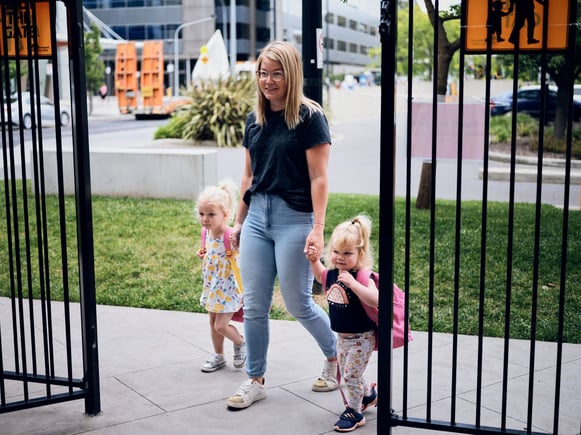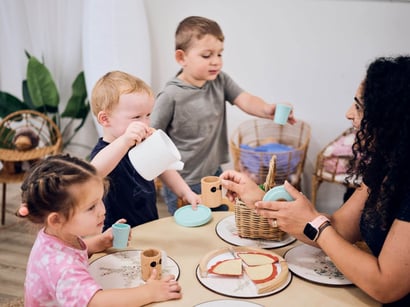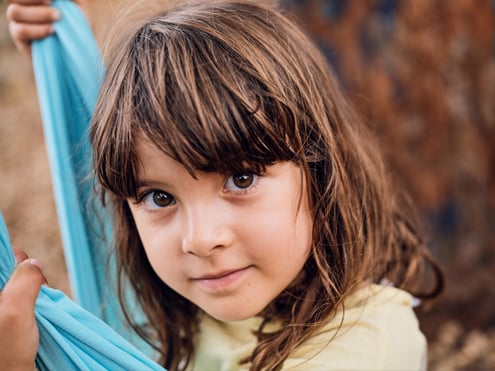Key Points
- Separation anxiety is a sign that your child has a secure attachment and healthy bond to you. You are their world. And they don’t like the idea of being apart from you.
- Separation anxiety is a normal part of childhood development. Most babies and toddlers will experience it at some point in the early years. The key is to take steps to actively manage it and to seek professional help if it becomes an ongoing concern
- If your child gets upset at preschool or school drop-off, many of the tips in this article to handle separation anxiety can help. Things like not sneaking off when they’re not looking and creating a goodbye routine will all help. There are also some specific things you can do to make the transition to school an easier one.
On this page
What causes separation anxiety?
What are the signs of separation anxiety?
How to manage separation anxiety in the daytime.
How to manage separation anxiety in the night time.
How to help a child with separation anxiety at school
How long does separation anxiety last?
Separation anxiety disorder in children
How you can help your child manage their separation anxiety
When to seek professional help
Separation anxiety is a very challenging thing to deal with… for both parents and their little ones. From clinginess and crying to hysterical distress, separation anxiety behaviours can vary between children and look quite different for babies, toddlers and older children.
Separation anxiety is a common and normal developmental stage of childhood. But there are things you can do to help manage separation anxiety in your child and minimise the distress you both feel. In this article we dive deep into what separation anxiety is, what causes it and how you can manage it.
What is Separation Anxiety?
Believe it or not, robust separation anxiety is a sign that you child has a secure attachment and healthy bond to you. You are their world. And they don’t like the idea of being apart from you.
It’s normal and expected that all children will have separation anxiety at some point. Separation anxiety is also something that can come and go as they reach different developmental milestones.
It’s also important to understand that separation anxiety in a baby can be quite different to in an older child.

Separation anxiety in babies
In young babies, separation anxiety occurs when they are around 9 months old. You may also see signs of it earlier when they are between 4 to 5 months old. However, remember that every baby is different so this is just a guide.
In the first months of life, your baby simply sees you as an extension of themselves. Then things start to change. They develop very strong attachments to you and they also learn object permanence, i.e. the concept that you still exist even if they can’t see you. They also have no concept of time. Whether you’re leaving for one minute or one hour, it feels the same to them. It’s the perfect storm for clinginess and peak separation anxiety.
It may last for a few weeks or it may last for a few months. Every baby is different and that is totally normal.
Separation anxiety in toddlers
Some babies don’t show any signs of separation anxiety at all. Which is why it can be quite the shock for parents when separation anxiety hits at around 15 months old. Even if your child does have separation anxiety as an infant, they can still experience a resurgence in toddlerhood.
In toddlers, separation anxiety can be a combination two things. The first is them expressing fear about being apart from you. The second is them expressing an opinion that they don’t want you to leave.
As with babies, separation anxiety in toddlers is very normal and it will usually ease over time.
Separation anxiety in children
Separation anxiety is not as common in children once they reach preschool or school age. By this age, it has usually stopped. However, there is a condition, separation anxiety disorder, that does affect some children.
If your child has reached this age and still gets severely upset when you’re separated, and this is interfering with daily life, they may have separation anxiety disorder.
You’ll find some further information on this condition later on in this article.
What causes separation anxiety?
 Have you ever noticed that your child’s separation anxiety comes and goes? Some days you can drop them off at preschool and they will be totally fine… the next day it’s a whole other story.
Have you ever noticed that your child’s separation anxiety comes and goes? Some days you can drop them off at preschool and they will be totally fine… the next day it’s a whole other story.
That’s because this anxiety can be triggered by certain changes, new situations or feelings that make them want to cling to you even more closely. These may include:
- A new baby in the family
- A new educator at child care
- Moving house
- The loss of a close family members
- Parental stress
Separation anxiety is also likely to be worse when a child is hungry, tired or feeling unwell.
What are the signs of separation anxiety?
If your child has had separation anxiety before, you’re likely familiar with the signs. But those signs can be different at different stages. Here’s a breakdown of the signs by stage.
Signs of separation anxiety in babies
A baby experiencing separation anxiety may:
- Cry when you leave the room.
- Be very clingy, especially in new situations or around new people.
- Wake during the night crying.
- Resist falling asleep or having trouble sleeping if you aren’t close by.
Signs of separation anxiety in toddlers
For toddlers, the signs may be similar to babies and also include:
- Tantrums when you leave the room.
- Resisting or fighting against other caregivers if you’re leaving.
- Fearful or restless behaviour.
Signs of separation anxiety in children
The signs of separation anxiety disorder in children are more intense and can interfere with your child’s daily life. These signs may include:
- Constant worry and agitation about being separated from you.
- School refusal.
- Insomnia.
- Headache, stomach ache or other physical manifestations of the anxiety.
- Excessive clinginess.
- Fear that you will get injured or sick while you’re separated from your child.
How to manage separation anxiety in the daytime
Separation anxiety will generally get better over time. But the best way to support this is by actively addressing and managing how your child is feeling. Here are some different strategies you can use.
actively addressing and managing how your child is feeling. Here are some different strategies you can use.
Practice and role play separation
By practicing leaving and then returning again, you can help to teach your baby or toddler that you will come back. It could be as simple as leaving your child with another caregiver while you go to the bathroom. Even games like peek-a-boo or hide and seek can help to practice being apart.
Implement a regular routine
Children thrive on routine. When they know what to expect, it is much easier for them to manage situations. This applies to how you say goodbye also. Create a little goodbye ritual such as a little song or a hug, kiss and a wave, always done in the same order and manner. This helps to create familiarity and comfort around saying goodbye.
Introduce new carers
Before you leave your child with a new carer, make sure you introduce them first. If you’re starting at a new childcare centre, arrange to come into the centre before you start. This way your child is somewhat familiar with the surroundings and the people who’ll be caring for them.
Be honest
Don’t try to sneak away and hope your child won’t notice. They will notice and it will do more harm in the long run, not to mention causing distress to your child. Instead, be honest. Tell them that you’re leaving and that you’ll be back to help build trust.
Don’t prolong goodbyes
While it can be hard to leave your child if they are distressed, a long, drawn-out goodbye usually doesn’t help. No does saying goodbye too long before you need to leave. Say goodbye, comfort your child if they are upset and then leave.
Acknowledge their feelings
Separation anxiety is normal and it’s normal for children to get upset. Brushing it off isn’t healthy for helping your child to manage their feelings. Let them know that it’s ok. Acknowledge that you can see they’re upset and reassure them that you’ll be back.
How to manage separation anxiety in the night time
If your child gets upset at preschool or school drop-off, many of the tips to handle separation anxiety listed above can help. Things like not sneaking off when they’re not looking and creating a goodbye routine will all help, even with a school-aged child. There are also some specific things you can do to make the transition to school an easier one.
- Talk about school and what your child can expect. Get them involved in packing their bag or preparing their uniform or clothes so there are no surprises on the first day.
- When you talk about school, talk positively. If you ask them if they’re worried when they’re not it can plant the seed of worry!
- Visit the school before the child starts. Afterwards talk to them about the school and features such as the playground or location of their classroom.
- Show understanding of the emotions your child is feeling. Acknowledge them and normalise them.
How long does separation anxiety last?
Every child is different. Some children will only experience distress when separated from their parent for a short time. For other children it will persist longer into childhood.
Generally you will find that separation anxiety will tend to peak by the time a child reaches 3 years old. After that, they start to understand that you will come back after you leave.
Separation anxiety disorder in children
If separation anxiety persists by the time a child reaches preschool or school age, it may lead to separation anxiety disorder. This may affect as many as 4% of children.
Separation anxiety disorder is characterised by anxiety that is more severe than children of the same age, such that it interferes with a child’s life. The symptoms go on for at least four weeks.
A child with separation anxiety disorder may be reluctant or refuse to go to school or preschool. They may report feeling sick when they are away from you and worry excessively about getting a family member getting hurt.
How you can help your child manage their separation anxiety
Children with stressed parents can also be affected by the way their parents are feeling. Aside from the actions you can take to help your child manage their own anxiety, managing your own stress and anxiety is a good place to start.
Things like eating well, exercising and getting enough sleep can all help to minimise stress. Meditation can also be helpful, as can talking to someone about how you’re feeling.

When to seek professional help
Your child may show signs that need professional help to manage their anxiety, such as:
- Ongoing school refusal.
- Excessive fears or worries, even for things like leaving the house.
- Regular complaints of feeling unwell.
- Social withdrawal.
- Clinginess of tantrums inconsistent with their age.
- Panic attacks.
- Anxiety that is intense, prolonged and interferes with daily life.
If you do need professional help you could speak to your child’s school or preschool teacher or school counsellor. Your GP, paediatrician or local community health nurse can also provide support and referral if required.
Seeking financial support for children with separation anxiety
You may be eligible to access Medicare rebates to help cover the costs of professional treatment for separation anxiety. With a mental health treatment plan from a GP or a referral from a psychiatrist or paediatrician, you may be eligible for rebates for up to 20 mental health service sessions each calendar year. These services can be delivered by psychologists, social workers or occupational therapists.
Coping with separation anxiety
Separation anxiety is a normal part of childhood development. Most babies and toddlers will experience it at some point in the early years. The key is to take steps to actively manage it and to seek professional help if it becomes an ongoing concern.
At Gowrie NSW, we help every child to discover their full potential in an inclusive and supportive learning environment.
Contact us to learn more about our approach to early education and how we can support your family.
Gowrie NSW Tip
We recommend enrolling your child for a minimum of two consecutive days at an early education and care centre, so they feel a sense of connection and belonging to people, and place, reducing separation anxiety.










.jpg)